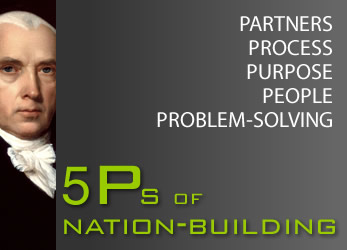Conclusion excerpt
Changing the World: the Future of Nation-building
Nation-building is not new. It is not a transitory topic either.
Nation-building is central to the history of American politics
and society. From the founding, Americans have been
nation-builders. From the founding, Americans have worked at home
and abroad to spread a model of united peoples, organized in representative
governments, with strong attachments to territory. That is the American creed. That is the history Americans have replayed from the aftermath of the Revolution to the war in Afghanistan.
 A society
of independent, similar, and cooperative states—that is the consistent
American vision of peace and justice, especially in times of extreme
threat. Americans seek security and prosperity through efforts at creating
political congruence amidst cultural diversity.
This vision of a "society of states" is idealistic and realistic, naive and
self-serving. It has promoted American profit, as other authors have
argued at length. It has also contributed to stability, good governance,
and growth in places like the American South and postwar Germany.
Many people have embraced the promise of nation-building. Many
others have criticized, resisted, and ignored American efforts.
A society
of independent, similar, and cooperative states—that is the consistent
American vision of peace and justice, especially in times of extreme
threat. Americans seek security and prosperity through efforts at creating
political congruence amidst cultural diversity.
This vision of a "society of states" is idealistic and realistic, naive and
self-serving. It has promoted American profit, as other authors have
argued at length. It has also contributed to stability, good governance,
and growth in places like the American South and postwar Germany.
Many people have embraced the promise of nation-building. Many
others have criticized, resisted, and ignored American efforts.
The history of nation-building is filled with conflicts and contradictions. It
is a history that defies easy categorization. The long record of nation-building is, in fact, quite mixed. It contains
enough hopes and frustrations to inspire both additional efforts
and popular discontents. The complex consequences of intervention
encourage a recurring cycle of improvements and inadequacies.
Nation-building never succeeds sufficiently to convince its critics, nor
does it fail enough to put off its promoters. The never-ending controversies
over nation-building are what make Americans who they are.
Since the days of George Washington, the United States has contributed
to the spread of the nation-state as the most accepted form
of political organization on the planet. The genius of this project comes from its encouragement of local autonomy without anarchy,
and effective authority without empire.
Nation-building is an effort
to nurture behavioral patterns that balance freedom and order, independence
and cooperation.
Although Americans frequently push this
process along, they have long believed that it is
an organic phenomenon—the product of natural human desires and needs. Americans
see their own history in their repeated nation-building efforts. They
see their own ideals and experiences in their endeavors to remake the
world.

Click to learn more about the 5 "P"s of nation-building.
This chapter looks forward to the almost inevitable American nation-building projects of the next decade. The history of the last 200 years cannot assure success, but it can help improve American policies, especially if we follow the "5 Ps."




